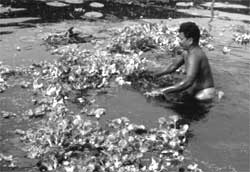Waste not
Waste not

in our country, most of the biogas plants installed are based on cowdung. In a significant departure from the usual, the Sadar Patel Renewable Energy Research Institute, Vallabh Vidyanagar, Gujarat, has developed a biogas plant which works on kitchen waste and aquatic weeds (Rural Technology, Vol 8, No 2).
Large quantities of waste accumulates, especially in community kitchens either as leftover cooked food or uncooked food like vegetable peels and rotten vegetables. Simply wasting all this proves expensive as kitchens usually use conventional fuels like liquified petroleum gas, kerosene or coal for cooking. One easy and cost-free method of disposing kitchen waste could be the installation of a biogas plant in the vicinity of a community kitchen. The fuel produced in the form of biogas could replace the consumption of conventional fuel substantially, the slurry coming out of the plant could be used as a good farmyard manure and all this could finally help maintain a clean, odour-free environment.
Agriculture Tools Research Centre, Surat, Gujarat, has developed a garbage gas manure plant (ggmp) which can be erected by local artisans for hygienically disposing garbage to produce fuel and manure. ggmp deals with all biologically decomposable soft perishable wastes. The soft organic matter is partly burnt as fuel; a part used in making farmyard manure and a good quantity is wasted. If all such wastes are decomposed through ggmp, enough biogas can be supplied to villages and cities together with organic fertilisers which can replace chemi cal fertilisers.
The complete biological decomposition of garbage in ggmp takes place in three stages







